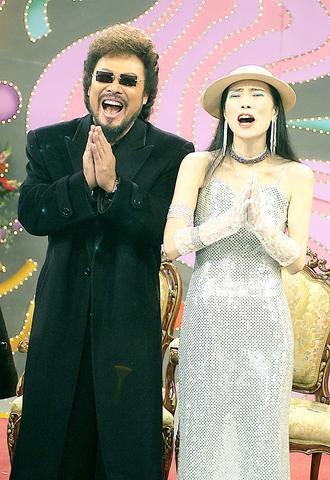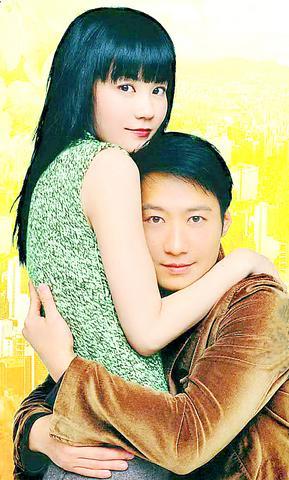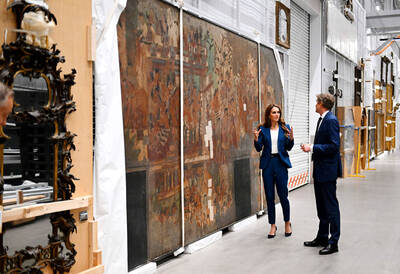Where to start with Hsu Chun-mei
Late last year, Hsu made her first appearance in the news when her five-year-old daughter was found abandoned at a shopping center and she said she'd left the child there because the kid was noisy and annoying. Hsu refused to take the child back into her care.

PHOTO: TAIPEI TIMES
Inexplicably, she parlayed this moment of fame into appearances on TV talk shows and variety shows, where she noisily held court on topics she is entirely unqualified to talk about and generally made an ass of herself in her hilariously accented Mandarin.

PHOTO: TAIPEI TIMES
Because no one knew where she'd come from and would ask her about her background, Hsu would fill in the blanks by saying she was from a very rich family in "society's upper crust," earning her the sarcastic moniker "upper-crust beauty" (
Without much to distinguish herself, Hsu has become a TV sensation merely by her flagrant and obnoxious self-promoting style, her bawdy outfits and her penchant for shooting her mouth off, which has drawn fire from practically everyone she's encountered, except for Zhang Fei (
Jacky Wu (
Hoping to capitalize on all the hype, SuperTV has signed Hsu as co-anchor and news analyst on the channel's 6pm news show. But the Broadcasting Development Fund (
Leon Lai (
The Chinese-language film that's creating the most waves of late, though, is Cellphone (

June 9 to June 15 A photo of two men riding trendy high-wheel Penny-Farthing bicycles past a Qing Dynasty gate aptly captures the essence of Taipei in 1897 — a newly colonized city on the cusp of great change. The Japanese began making significant modifications to the cityscape in 1899, tearing down Qing-era structures, widening boulevards and installing Western-style infrastructure and buildings. The photographer, Minosuke Imamura, only spent a year in Taiwan as a cartographer for the governor-general’s office, but he left behind a treasure trove of 130 images showing life at the onset of Japanese rule, spanning July 1897 to

One of the most important gripes that Taiwanese have about the Democratic Progressive Party (DPP) is that it has failed to deliver concretely on higher wages, housing prices and other bread-and-butter issues. The parallel complaint is that the DPP cares only about glamor issues, such as removing markers of Chinese Nationalist Party (KMT) colonialism by renaming them, or what the KMT codes as “de-Sinification.” Once again, as a critical election looms, the DPP is presenting evidence for that charge. The KMT was quick to jump on the recent proposal of the Ministry of the Interior (MOI) to rename roads that symbolize

On the evening of June 1, Control Yuan Secretary-General Lee Chun-yi (李俊俋) apologized and resigned in disgrace. His crime was instructing his driver to use a Control Yuan vehicle to transport his dog to a pet grooming salon. The Control Yuan is the government branch that investigates, audits and impeaches government officials for, among other things, misuse of government funds, so his misuse of a government vehicle was highly inappropriate. If this story were told to anyone living in the golden era of swaggering gangsters, flashy nouveau riche businessmen, and corrupt “black gold” politics of the 1980s and 1990s, they would have laughed.

Imagine being able to visit a museum and examine up close thousand-year-old pottery, revel alone in jewelry from centuries past, or peer inside a Versace bag. Now London’s V&A has launched a revolutionary new exhibition space, where visitors can choose from some 250,000 objects, order something they want to spend time looking at and have it delivered to a room for a private viewing. Most museums have thousands of precious and historic items hidden away in their stores, which the public never gets to see or enjoy. But the V&A Storehouse, which opened on May 31 in a converted warehouse, has come up